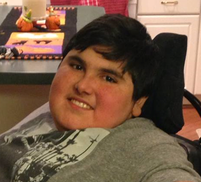
“Why me?”
It’s clear what Alex is asking. He wants to know why he has Duchenne Muscular Dystrophy. He wants to know why he is not healthy like his friends and cannot walk or use his arms like they can. He explains how he watches them run down the street, bound effortlessly over uneven ground, ready to play in the next pick-up game in the cul-du-sac or driveway, and he wonders why he can only sit and watch. You can practically feel his frustration. As a parent, you want to make it all better or at least go away temporarily. With Duchenne, you know you can’t. We hope, wish, and plead that Duchenne is a bad dream. But it’s more than that. It’s reality.
“Why do I have Duchenne, Dad? It’s not fair! It’s not fair! It’s not fair!”
What do you say?
I’m here to tell you, when you hear it from your kid, who knows what will come out of your mouth. I guarantee that your first reaction will be a deep sigh, and then you’ll begin with “Well…” After that, all bets are off. You may stutter and stammer a response, hopefully one that makes some sense to a kid. You could respond with the tried and true, the traditional way our culture handles such mysteries. Plant a seed of hope and do so with a smile. Say anything but the grave truth. Tell him stay strong, that a cure is right around the corner, and that doctors are working night and day. Say it’s all meant, and that God has a plan and that someday your Duchenne will be gone! Hopefully in this world, but certainly the next. Keep the faith. Prayers are occurring daily. And when they do….
Reality is less radiant. No matter your passion or faith or excitement for eventual healing, the culturally accepted words are difficult to uphold when you see Duchenne’s current survival rate of zero.
Duchenne is a slow train wreck where the metal collides, scrapes, twists, buckles, bends, and breaks as it derails, lifts, falls, and wrecks throughout your son’s entire lifetime. It never takes a break. Just when you figure out how to handle the endless chain of adversities, another creeps up. Difficulty walking long distances? Get a stroller chair. Falling face first onto the ground? Get a power wheelchair. Difficulty coughing? Get a cough assist. No longer able to sit up on a toilet? Devise alternative means for bodily functions. Cannot sit up in bed? Become skillful with pillows or get an incline bed. Cannot turn or roll over during the night? Do it for him. Cannot lift a book? Help or read to him. Cannot lift food to his mouth? Again, do it for him. Cannot get out of bed? Use a hoist to lift him into his wheelchair. Cannot access the family car? Get an accessible vehicle. Cannot get his wheelchair into your house? Add a ramp and adapt your house. Cannot visit friends’ inaccessible houses? Bring along a portable ramp. Uneven sidewalk? Find another way. Storefront with a step? Find another store…. I could go on. It's practically endless.
The truth is that Duchenne is a tragedy with an unknown number of acts, where the curtain teases and threatens to fall at any moment. Alex doesn’t say it, but he knows something isn’t right. His body aches in ways we take for granted. His back cracks for the simplest of reasons. His muscles tighten and refuse to cooperate. Someday, he’ll know the statistic above. Someday, he’ll read about it or someone will unintentionally (or not) describe his grim future.
What then?
As I see it, we must be honest. He deserves as much, for what he must endure.
This is what we tell him.
“Alex, you have Duchenne. We know it sucks, and we hate it as much as you do. We know you want to stand and walk and run like your friends. We know you want to do many things that you cannot. But, you know what? It’s okay, because we love you just the same. It doesn’t matter if you walk or run, sit or stand. You are you….and we love you just the way you are!”
The smile Alex gives in return is priceless. It’s genuine and loving, and precedes hands held open waiting for you to bend down for a heartfelt hug. Although his arms cannot easily wrap around you, his emotion clearly shows his appreciation for loving, understanding, and accepting him. The feeling makes you both forget about the train wreck and appreciate the moment, which is the ONLY way to handle Duchenne, and sometimes the only way to handle life – one moment at a time.
Through it all, we try to help Alex to focus on the things he can control, like his ability to smile and help others smile, sleepovers and staying up all night with buddies, laughing hysterically, bonding over a shared video game success, enjoying anything dipped in barbeque sauce, strolling along the sidewalk and visiting neighbors, watching movies, talking with people and helping to brighten their day, petting every dog you see, or going to zoos, bookstores, malls, and baseball games, to name a few. But, most of all, we help Alex to laugh, love, and live the moment. The moment is the only place where life is guaranteed.
When we hear laughter coming from Alex’s room, it reinforces our belief that life is what we make of it. Alex thankfully chooses to laugh and live. He chooses happiness when sorrow is lurking ever-present and a heartbeat away. He chooses to laugh in the rain, despite gathering clouds on the horizon.
“Why me?”
“It doesn’t matter. You’re you, and we love you just the way you are!”
Alex reaches over to hold my hand as he settles in to fall asleep. “Thanks, Dad.”
“No, thank YOU, Alex.”
 RSS Feed
RSS Feed